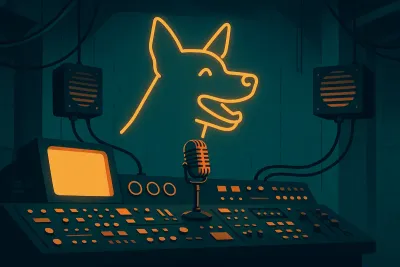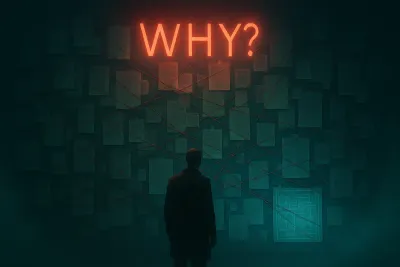How to show up in AI models

”Being lost is worth the being found.” Neil Diamond
Previously at the Volcano Base, I’ve been:
- developing automated business systems for a cyber security firm
- speaking about AI on a panel for the International Broadcasting Trust
- talking to several nonprofits about the opportunities around AI
- responding to a RFP about AI system design (a bit terrified about how much I need to win this one)
- meeting lots of new people for random chats about hairstyles and flamingoes
- researching and writing a (bloody good) white paper about how to prepare for 2030 (you can sign up for the accompanying webinar here)
- drafting a “founder’s guide to AI”
- supporting a public sector body with the AI elements of their service design
- desperately trying to figure out how to generate new business (there have been actual tears)
- and singularly failing to record a “working with data and AI” course for The GenAI Academy (sorry guys)
Ooof. All this while having some extremely difficult, life-changing developments at home. Before you ask, I’m fine. Really. As Chumbawamba so eloquently put it, “I get knocked down, but I get up again”. God, I really hate Chumbawamba. Jerks.
Mission Briefing
How to show up in AI models
Since doing that panel for the IBT, I’ve had several versions of this same question: how do we go about getting our brand/product/company into AI models so we turn up in “AI chats”. So I thought I’d write up my answers to make the knowledge more readily available for people that want it. See? That’s a nice thing to do, isn’t it.
Disclaimer first: I’m not a professional SEO (search engine optimiser), but I can’t resist a rabbit hole.
Incidentally, I’m now using SEO to mean “search everywhere optimisation” to avoid the bonkers proliferation of totally unnecessary acronyms: GEO, AIO, AIEO…. <Shudder>.
Bing
Yes, Bing. Make sure your website is submitted via Bing Webmaster Tools. Bless geeky, awkward Bing, sitting there talking to nobody at their friend’s birthday party, with a plaster holding their glasses together, faintly smelling of wee. WTF is a webmaster these days? Is it a new D&D sub-class?
As a search engine, Bing’s a bit of a weed, but it does power the search features in ChatGPT and Microsoft Copilot. So you want to get on it. Takes 5 minutes to login and add your website.
Forget driving traffic
More of a mindset shift, this one. Traffic referred to websites has, in general, been in decline for the last four years or so. People can do most of their research about you without ever going anywhere near your website, and that’s unlikely to change. So if your job has a traffic-driving KPI, you can’t win, and you need to talk to your boss about getting rid of it.
Why would someone go to your website? For some sort of transaction. To buy something, sign up for your newsletter (thanks, btw), make a donation, download something. You get the idea. In fact, some research shows that while traffic has been declining, these transactional conversions have been increasing. So it’s not all doom and gloom (unless you’re sat next to Bing at that party).
Mr Rand Fishkin (best name evah) at Sparktoro is much more eloquent and experienced on this topic than I am.
Syndicate
It’s the age-old marketing advice: go where people are, don’t expect them to come to you. Nothing new here.
If you can’t rely on people coming to your site to read that ever-so-important-content-item your team spent ages on, make it available elsewhere.
It doesn’t have to be everywhere, but there are some locations that the AI models “consume” because they find them to be authoritative. These include the usual top-tier publications (you’ll need to get your dusty PR specialist out of the cupboard to deal with those) but also places like Reddit, Quora, Instagram, YouTube and others.
So, repurpose your content (either manually or automate it) and plop it in these places, even just excerpts.
Remember, we’re talking about making content easy to digest by an AI model, and they’re based on predicting text patterns and understanding the relationship (vector) between words and concepts. So, make sure your company name, or product name, is in the excerpt, in a phrase you want the AI to associate you with. Like “Phil Dearson at Volcano Base talks a lot of gubbins about AI and automation”. If the model reads versions of that phrase in several places, the chances are I’ll pop up when someone’s talking to a chatbot about AI gubbins. It could happen.
Again, check out Mr Fishkin and his aquatic relatives for more erudite thinking on the topic.
Classified Intel
Some interesting stuff I discovered on my adventures.
The $100 Trillion Question: What Happens When AI Replaces Every Job?
Anton Korinek, professor of economics at the University of Virginia and a leading AI economist, reveals why artificial general intelligence could arrive in just 2-5 years, and why our entire economic system will collapse without radical changes.
Roots of trust by Rachel Botsman
Rachel Botsman does a talk at the RSA about the world's first org chart. Might not sound like the most interesting thing in the world, and it isn't. But it is quite interesting. It's from 1855 and it's a total inversion of the sort of org charts ushered in by IBM.
The Great Flattening (or why truly creative people shouldn't freak out about AI)

I love the way Justin thinks about creativity and AI in this post. He posits that only people without talent have anything to fear from AI.
Your data is not shared. Unsubscribe with 1 click.









Member discussion